Carlos Barral and the struggle for knowledge of the holocaust during the Franco regime
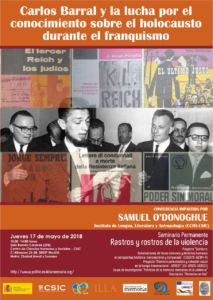
Conference by:
C/Albasanz, 26-28
Metro Suanzes & Ciudad Lineal
Free entry

Conference by:
Free entry
Guardar
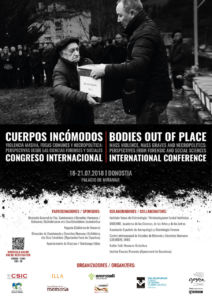
18.jul – 21.jul
CONSULT THE COMPLETE PROGRAM (Spanish/English) (pdf.)
CONSULT THE COMPLETE PROGRAM (Basque/English) (pdf.)
To sign up:
https://www.uik.eus/en/cuerpos-incomodos-violencia-masiva-fosas-comunes-y-necropolitica
This international conference invites some of the leading international specialists in the analysis of mass grave exhumations as human rights tools. Mass grave exhumations linked to human right violations, which already started in the mid-eighties, have become increasingly important worldwide in the 21st-century. Gradually, they have become an increasingly prestigious phenomenon for truth, justice and reparation of victims of the outmost importance, as they are radically transforming the ways in which societies deal with the traumatic past, including the consolidation of forensic science as a privileged technique and methodology for interpreting the past –a phenomenon known in social sciences as the forensic turn. The purpose of this conference is to critically analyse, in a comparative fashion, different processes of mass grave exhumations in various parts of the world, including Russia, Timor, Central African Republic, the Netherlands, Germany, the US, Vietnam, Poland, Peru, Colombia, Mexico and Argentina, as well as the more specific cases of Spain and the Basque Country. Thematically, the conference includes from Civil War mass grave exhumations in Spain to the Soviet gulags, the identification of human remains recovered in the twin tower’s rubble, the search for US MIAs, the case of the Mexican searchers, post-war plundering in Holocaust mass graves, the cultural and political elaboration of the disappeared, and the religious aspects of exhumations, among others. In order to engage the comparative study of mass grave exhumations in different historical, cultural and political contexts, the conference includes scholars from different disciplines: forensic doctors, social anthropologists, lawyers, political scientists, sociologists, archaeologists, historians and literary critics. The conference also includes a monographic panel with representatives of Spain’s main memorial institutions.
Objectives:
Foster the formal and informal exchange and debate of the participants in the conference with world experts on this topic and introduce the participants to:
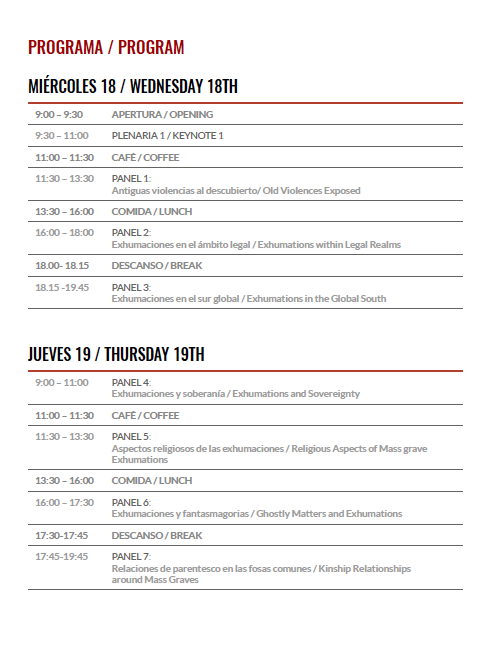
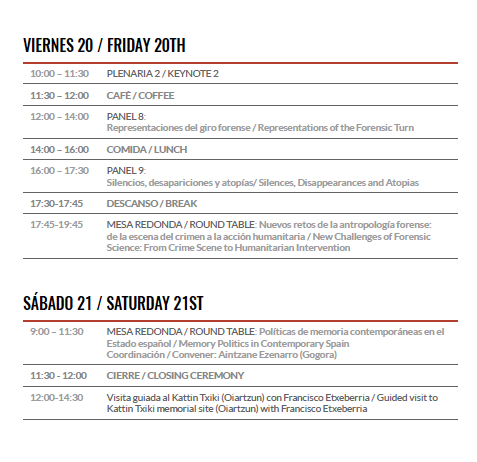
Zoé de Kerangat will participate in the international Symposium “Conflict, Memory and Justice” in Cali, Colombia, 9-11 May, 2018.

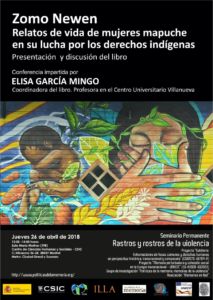
Conference by:
Free entry
Guardar
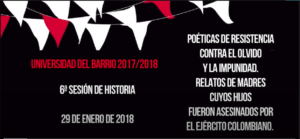
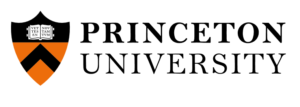
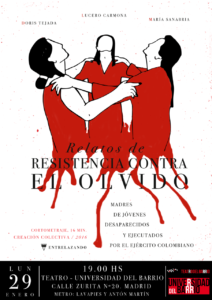
Since 2002 in Colombia, more than 6,800 cases of extrajudicial executions have been reported, crimes against humanity that today, despite the rhetoric of peace, remain unpunished. Based on the experience and the story of four mothers, Maria Sanabria, Doris Tejada, Luz Marina Bernal and Lucero Carmona, whose children were disappeared and executed by the Colombian army in 2008, we will talk about how to narrate violence and pain, about the processes of resistance and struggle, and the consequences of the State that murdered its children being the one who intends to repair them. Reflections on cruelty, forgetfulness, impunity and justice.
Coordination. Laura Langa
Dynamics: Two creative projects will be presented as resistance actions. Two experiences of teaching the irreparable, examples of how to transform sadness and pain. A transformative commitment to undertake research and the role that the academy can and should play in these processes.
(1) Reading fragments of the book “Poetics of resistance against impunity and oblivion”. .. A publishing project in development, written by the mothers themselves.
(2) The screening of the short film “Relatos de resistencia contra el olvido” (16 min Colombia 2016. ENTRELAZANDO) ENTRELAZANDO), a collective creation based on the dreams that these mothers had at the time of the murder of their children.

https://www.memorystudiesassociation.org/copenhagen-conference-2017-program/
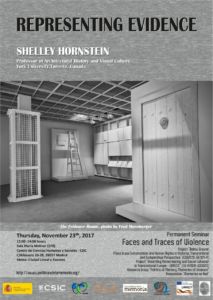
Conference (in English) by:
Shelley Hornstein
(Professor of Architectural History and Visual Culture, York University, Toronto)
Free entry
Guardar

6th Global Conference on Genocide
CALL FOR PAPERS
Medical Faculty of Aix-Marseille University (France), 4-7 July 2018
Genocide and Mass Violence : diagnosis, treatment, and recovery ?
Humanities, social and medical sciences facing extreme violence
Conference Steering Committee
Dr. Elisabeth Anstett, CNRS, Chair of the Committee
Mme Laetitia Delouis, CNRS-AMU, Coordinator of the Committee
Mr Valery Ravix, AMU, IT manager
Conference Scientific Committee
Prof. Pascal Adalian, forensic anthropologist, AMU (France)
Dr. Pamela Colombo, sociologist, EHESS (France)
Prof. Jean-Marc Dreyfus, historian, the University of Manchester (UK)
Dr. Francisco Ferrandiz, social anthropologist, CSIC (Spain)
Prof. Caroline Fournet, legal scholar, University of Groningen (Netherlands)
Prof. Sévane Garibian, legal scholar, University of Geneva (Switzerland)
Dr. Gabriel Gatti, sociologist, University of Basque Country (Spain)
Dr. Anne Guillou, social anthropologist, CNRS (France)
Prof. Mario Ranaletti, historian, Universidad Nacional Tres de Febrero (Argentina)
Nicky Rousseau, historian, University of Western Cape (RSA)
Dr. Michel Signoli, archaeologist, CNRS (France)
Context
The International Network of Genocide Scholars (INoGS) was founded in January 2005 in Berlin to provide genocide studies with a non-partisan forum through which to present research and analysis on any aspect of genocide as well as other forms of collective violence. Because genocide is a highly contested legal, historical, sociological and political concept, INoGS has, since its founding, maintained support of research-led analysis rather than politically-defined agendas.
The series of Global Conferences organized by INoGS since 2009 in Sheffield, Brighton, San Francisco, Cape Town and Jerusalem, have witnessed intensified scholarly engagement with a range of issues of fundamental importance to the field of genocide studies, including theoretical and methodological approaches to the subject, the legal and ethical bases upon which to approach episodes of extreme violence, as well as the need to develop more effective means of stopping and preventing mass violence globally.
Conference aims
For more than 70 years, following the seminal analysis developed by legal scholar Raphael Lemkin, academics, practitioners, and researchers from a variety of disciplines have addressed the issue of genocide and mass violence using a wide range of empirical and theoretical approaches to explore case studies throughout history. Interdisciplinary research across the humanities, legal and social sciences, as well as comparative approaches, have thus characterized genocide studies.
However, even if extreme violence is relevant to various medical fields such as psychology, psychiatry and forensic anthropology, dialogue with the humanities and social sciences has been slow to develop. The 6th Global Conference of INoGS, to be held at the Medical Faculty of Aix-Marseille University (France) on 4-7 July 2018, therefore seeks to open new avenues for research on extreme violence while stimulating interdisciplinary exchanges between the humanities, social and medical sciences. The early detection and prevention of mass violence represents a global challenge for each and every one of these fields of knowledge.
This conference will thus seek to discuss various examples of past and contemporary mass crimes, delve into the causes as well as the short and long-term effects of genocidal processes, and foster dialogue between stakeholders who rarely exchange views.
Conference topics
The organizers invite proposals for papers, panels and roundtables on any aspect of genocide and mass crime. We are especially keen to receive proposals from Latin America, Asia and Africa. Scholars working on topics such as sexual violence, forced disappearances, torture, mass trauma, forced separation of children from their families, conflict resolution, and mediation initiatives are particularly encouraged to submit abstracts. Presentations on recent experiences of mass violence, such as those in Syria, Darfur, Iraq, Mexico, Colombia, and Myanmar are expressly welcome. We encourage the submission of papers and panels on issues regarding violence contamination and containment processes. Another theme of particular interest is that of humanitarian intervention and the ethical challenges it poses.
Other topics of interest include but are not restricted to :
Symptoms and diagnoseis
Individual cases or comparative analyses of genocide and mass violence
Colonialism and mass crime
Prevention of collective violence
Gendered violence, abduction and forced transfer of children from their families Mass trauma : voices of victims
Roles of perpetrators, bystanders and victims
Forensic architecture, satellite imagery and tools for detecting mass murder
Mass death and migration
Refugee camps
Treatment
International law, criminal tribunals, and the International Criminal Court
Humanitarian and military interventions
Transitional justice
Mass exhumations and identification of victims
DNA banks
Recovery
The repercussions of mass violence in both the short and long term
The politics of apology, reconciliation and restitution
Genocide denial, justifications and silences
Memorialization and commemoration of atrocities
Genocide, mass violence and the internet
Representations of genocide in literature, film, art, music and other media
Academic and educational practice within the field of genocide studies
Submission procedure
Participation is not restricted to INoGS members. We welcome interdisciplinary and theoretically-informed approaches as well as trans-disciplinary dialogue. Submissions from scholars, postgraduate students, as well as practitioners and researchers working in government, the NGO sector and other institutions are invited.
From mid October 2017, prospective participants will be able to upload proposals in the form of abstracts of no more than 250 words via the conference website at http://inogsconference2018.com . A biographical sketch of no more than 100 words will also be required. Panel and roundtable submissions need, in addition, to explain the rationale behind the suggestion. Queries relating to this process can be sent to admin@inogsconference2018.com . Applicants can expect to learn the outcome of their proposals within four weeks of submission. After their proposals have been accepted participants will need to register online at http://inogsconference2018.com/ which contains further information about the conference, fees, accommodation options, travel advice, and other relevant matters. Participants registering before 15th February will receive a 10% discount for early registration.
The closing date for paper, panel and roundtable submissions is 15th March 2018.
Funding Opportunities
INoGS is pleased to announce that funding is available to subsidize the attendance of scholars and PhD students from the Global South and from countries experiencing major financial difficulties. The number of grants available is limited.
Prospective presenters from the Global South and from countries experiencing major financial difficulties are thus invited to apply for support to attend the conference under the conference website’s “SCHOLARSHIPS” tab, after their paper or panel proposal has been accepted. The closing date for applications is 28th February 2018 and awards will be announced before the end of March 2018. Please refer to the conference website for details.
http://www.inogsconference2018.com/spip.php?rubrique17
El pasado bajo tierra: exhumaciones y políticas de la memoria en la España contemporánea en perspectiva transnacional y comparada
Proyectos Asociados:
HISTOFOR: PID2024-159223NB-I00 (2026-20289
MEM2OR: BICON24084 (2025-2026)
NECROPOL: PID2019-104418RB-I00 (2020-2024)
SUBTIERRO: CSO2015-66104-R (2016-2019)
UNREST: H2020 REFLECTIVE-5-2015, ref. 693523 (2016-2019)
PASADO BAJO TIERRA: CSO2012-32709 (2013-2015)
ISTME: COST Action IS1203 (2012-2016)
POLMEM: CSO2009-09681 (2010-2013)
SPBUILD: 7PM MARIE CURIE, ITN 238589 (2010-2013)
PIE CSIC: 200710I006 (2007-2009). Las políticas de la memoria en la España contemporánea
Centro de Ciencias Humanas y Sociales - Consejo Superior de Investigaciones Científicas.
Offices: 1F25 and 1F18
Albasanz 26-28.
Madrid 28037 (Spain)
politicasdelamemoria@gmail.com
